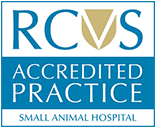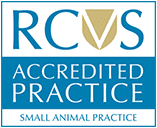You may have seen articles in the press and online discussing the over vaccination of pets and the discussion of titre testing.
We wanted to put some information together to allow you to make an informed choice regarding vaccination for your pet.
A titre test is a blood test that can show whether your pet has antibodies for a particular illness.
Titre testing can be used to determine the effectiveness of a vaccine or the presence of any natural immunity towards disease.
Your pet needs antibodies against individual diseases to enable their body to attack the pathogen (disease) and remove it from their system.
Therefore the presence of antibodies to a particular illness may suggest that your pet is immune to that illness.
Unfortunately things are not that simple and whilst a titre test can show antibodies for certain illnesses it may not be useful in determining true immunity (the body's ability to defend itself against that illness).
There are two different types of immunity in our patients – antibody immunity (measured by titre testing) and cell immunity (which is not measured by titre testing). The two types of immunity are believed to normally correlate but it is not clear how much.
This means that the presence of antibodies, or their absence, may not necessarily tell us if your pet will or will not get a disease.
To complicate things still further titre tests are not 100% reliable and there are many different tests available on the market. It is possible to get false negative results (where the test says your pet has less antibodies than it actually does) and false positive results (where the test says your pet has more antibodies than it actually does). False positive results can lead you to believe that your dog has antibody protection against disease that it doesn’t have.
As a UK veterinary practice we believe that vaccination against the core diseases (canine parvovirus, distemper, canine hepatitis and leptospirosis for dogs; feline panleukopenia virus, feline herpes virus and feline calicivirus) and non core diseases (including kennel cough and feline leukaemia virus) protects your pet and the wider animal population by minimising the chances infectious disease has to infect new victims.
We strongly advise that puppies and kittens are given their initial vaccines when they are young as the immunity they get from mum starts to drop as they get older and needs a boost. This initial vaccine course comprises of two vaccines given 2 – 4 weeks apart for dogs and 3-4 weeks apart for cats, followed by their first ‘booster’ when they are just over a year old.
The protection from the leptospirosis vaccination does not last a long time and it is for this reason we recommend yearly vaccination against this disease. We know that the immunity for the other diseases does last longer and it is because of this knowledge that we vaccinate against parvovirus, hepatitis, and distemper every 3rd year.
We advised that you vaccinate against kennel cough if your dog is socially active – if it meets other dogs in kennels, doggy day care or out on walks or if it walks on areas that other dogs also enjoy.
For our feline friends the use of vaccinations and the length of their immunity is an area under much investigation and study currently.
We can also vaccinate against Rabies if your pet is travelling abroad and this is a legal requirement.
If you would rather we titre test your pet to check their antibody levels to canine parvovirus, hepatitis and distemper before they receive their vaccine please let us know and we can arrange to take a blood sample and run the test.
All of our vets are more than happy to discuss our vaccination protocols and provide you with any information you may need to make an informed choice that is right for your pet and your family.
It is important to note that some establishments (such as boarding kennels, catteries or doggy day care providers) will not accept your pet unless they have a full vaccine history in line with manufacturer guidelines. Pet insurance companies may refuse cover or reject a claim relating to an illness that could have been prevented by vaccination.





